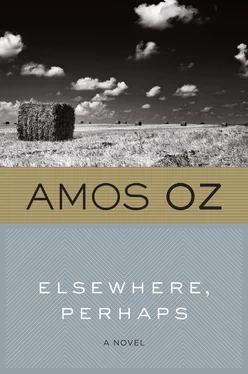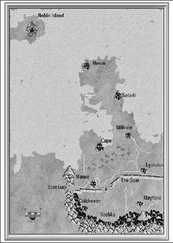A few days have passed. May Day has gone by, with its unexpected rainstorm, and the festival of Shavuoth is approaching. We have recorded various events, here and there, but the events are non-events. Unwillingly, we must admit that nothing has happened. We have met some of the members of the kibbutz, we have looked at a pretty girl, and we have been informed by gossip of a curious lovers' tiff. Here and there the names of the Berger brothers have cropped up, Nehemiah Berger of Jerusalem and Zechariah-Siegfried in Germany. We have made the acquaintance of the fundamental tenets of kibbutz ideology and have not refrained from hinting at a few deviations from them; we are writing about human beings, after all. Even Ido Zohar's unhappiness is not beyond our comprehension. As the kibbutz truck driver puts it, people are flesh and blood, not myrrh and frankincense.
The festival of Shavuoth is not far off now, and getting closer day by day. The dancers meet every evening for a long and thorough rehearsal and practice seriously for their performance at the festival. Noga Harish is the star attraction of the dance of the seven kinds of fruit. She is a slender, enchanting vine. Her hands tremble gracefully to represent the little vine shoots. Her fingers are twining tendrils. Her body is a bunch of ripening grapes. The reader must excuse us: we, too, after all, are flesh and blood, not myrrh and frankincense.
After rehearsals, Noga slips away to her secret assignation in the wood by the swimming pool. Dafna Isarov, her plump roommate, observes her jealously. Noga thinks that Dafna is asleep when she gets back, but Dafna, lying with the sheet pulled up over her head, is tense and alert in every pore.
Rami Rimon has still not managed to win her over. The girl shrinks from becoming a woman. Rami wonders what he has done wrong and can find no answer. He supposes that he must press harder than he has pressed so far. It is well known that women admire strength. "The more you beat them, the better they be," the proverb says. He curses his weakness. He certainly won't get anywhere by talking Talking is tricky. She can outtalk him any day. Even his mother can outtalk him. He has still not managed to convince her to give her written consent to his service with the paratroopers. Tricky subject. I'm not a baby, and what happened to Yoash wasn't my fault. Why does my whole life have to be determined by what happened to him? My life is my life. Mother and Noga are in some sort of league against me. I'm sure they get together behind my back and talk, perhaps even laugh. Still, he laughs longest who laughs last. That's what the proverb says.
Fruma Rominov and Noga Harish do not get together behind Rami's back, but there is no denying that there is something between them. We would never have thought Fruma capable of displaying such affection. The widow has a soft spot for Noga Harish. Once they happened to sit at the same table in the dining hall, and Fruma smiled at Noga and even said to her:
"You can eat as many potatoes as you like. You've got nothing to be afraid of. In fact, you could do with putting on a bit of weight. You'd be even better looking than you are."
And one day Fruma went to Noga's and Dafna's room while they were out and left a dish of homemade cookies on Noga's bed. She hasn't got a mother, after all, so there's no one to give her an occasional treat.
Fruma's cookies are justly celebrated. Not a hint of her bitterness can be tasted in them. It was Dafna Isarov who ate most of them, but it's the thought that counts. There's no doubt at all about Fruma Rominov's thoughts. Israel Tsitron told Hasia Ramigolski about a quarrel he overheard one night when he was on duty, and Hasia did not refrain from passing the good news on to Fruma.
Every Wednesday evening the music circle meets in Herbert Segal's room. A subdued atmosphere of culture dominates these meetings. Segal's room is lined with crowded bookshelves: philosophical works and economics books in German and Hebrew, and even in French, albums of reproductions of works of art, various periodicals, and, of course, treatises on animal husbandry and dairy farming. There is also an upholstered rocking chair and an automatic record player. The latter is the property of the cultural committee of the kibbutz, but its home has been in Segal's room ever since the stormy departure of his predecessor as convenor of the group.
The room is full of smoke. Members are seated on the chairs, on the solitary bed, on the Oriental poufs, and on the plaited straw mat.
Segal opens the evening with a few well-chosen words: the composer's historical background, the themes, the structure of the work, the interpretation in the present performance.
Briskly, the record is deposited on the disk of gray felt, the needle lands gracefully at the beginning of the groove, the first solemn notes ring out. A feeling of fellowship descends on the gathering. Some of the women have their embroidery in their laps, but their work does not distract them from the music; on the contrary, it helps them to relax and succumb to the gentle ripples of sound. Some of the men beat time with their feet. Their concentration prevents them from noticing Herbert Segal's disapproving looks: rhythm is the fundamental element in creation. By beating time they show that their experience of the music is more basic. There are different layers in music, one inside the other. Some people can reach only the outermost layer. Curiously enough, it is these whose faces quickly take on a rapt, ecstatic expression. Herbert himself sits with his head drawn into his narrow shoulders, his back rounded, his mouth open, his hands to his temples, completely surrendering to the music. He is somewhere else.
The older members, who were born in Germany or in Russia, can see the far-off streets of their childhood, lashed by dark rain, perhaps, or shrouded in gloomy fog. Even the younger people, who were born here, feel a sad longing for far-off places, unknown, unnamed places that are far, far away and full of sadness. Silent sorrow settles on every face. They are human beings, tillers of the soil. They are weary. Their eyes are closed. Sorrow clasps their hearts. And our own love, which we have condemned to cold oblivion.
In the interval between two works Nina Goldring and Bronka Berger serve tea. Herbert Segal, as a bachelor, is not expected to act as host. In any case, he is busy at the moment, blowing a speck of dust off a gleaming record.
Three or four times a week Reuven Harish has to present himself in the square in front of the dining hall to receive tours. He greets them in his usual friendly voice. Explains briefly the fundamental principles of the kibbutz ideology. Points out the symbolic contrast between the valley and the mountains.
These last days Reuven has been suffering from dull pains in his chest. They come only once or twice a day, and they may or may not be due to some physical cause. Certainly overwork and tension play their part. He has been unable for some time to put a single idea into verse. He walks as if he were carrying a heavy load. This is apparently why a slight change has come about in his relations with Bronka. One evening he told her he felt tired and sick and left her earlier than usual. Bronka did not try to stop him. It is possible that the weight which has been pressing on him is the cause of this slight change that can be detected in Bronka. Or perhaps it is Bronka who is responsible for his feeling it. Noga has observed all this. Reuven is observant, and he has seen Noga eying him in a strange way, as if she is glad to see him suffer and anxious on his behalf at the same time.
On Saturday evening she sat on the lawn with him and stared at him so pointedly that he could not stop himself asking:
"Why are you staring at me like that? Did you want to say something to me?"
Читать дальше












